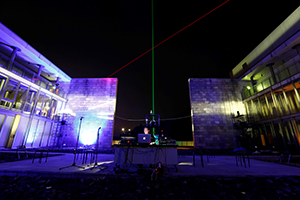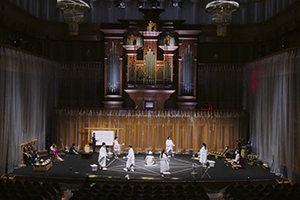No.sfa0047
2021/3/18
- Culture / Sports
“Persepolis―Tape Music in Akiyoshidai ”
“MUSICA CRAS GIFU 2020 Masahiro Miwa Festival -Purified Night-”
announced winning performances of the 20th Keizo Saji Prize for 2020
Download PDF
 |
 |
|
Persepolis―Tape Music in Akiyoshidai |
MUSICA CRAS GIFU 2020 |
The Suntory Foundation for the Arts (Directors General: Tsuyoshi Tsutsumi and Shingo Torii) has announced that the 20th (20) Keizo Saji Prize, bestowed on candidates selected from among those who gave predominantly music-based public performances held in Japan during the year, with winners chosen based on a willingness to challenge and on superior performances that engender a strong reaction, has been awarded to “Persepolis―Tape Music in Akiyoshidai ”&“MUSICA CRAS GIFU 2020 Masahiro Miwa Festival -Purified Night-”.
▽ Selection process
A qualifying round was held on Tuesday, February 23, 2021 by online to consider applicants who had given public performances in 2020. After careful consideration, “Persepolis―Tape Music in Akiyoshidai ”&“MUSICA CRAS GIFU 2020 Masahiro Miwa Festival -Purified Night-”were chosen as the recipients of the 20th (2020) Keizo Saji Prize, a decision that received the formal agreement of the Board of Directors of the Foundation on Tuesday, March 16, 2021.
▽Prize-money Total ¥2,000,000, ¥1,000,000 will be given for each.
▽The members of the selection committee
Seiji Choki, Atsuya Funaki, Nobuhiro Ito, Seiko Ito, Morihide Katayama, Mikako Mizuno, Yoshihiko Nonomura, Miyuki Shiraishi (In alphabetical order)
▽“Persepolis―Tape Music in Akiyoshidai ”
(Reason for the award)
It was a multi-channel outdoor performance that brought together Xenakis’s “Persepolis,” Joji Yuasa's “Icon on the Source of White Noise,” and Nono's “La Fabbrica Illuminata,” all classical masterpieces of analog tape music (with soprano vocals on Nono's work). Xenakis’s piece had its world premiere in the ruins of Persepolis in Iran, but the Akiyoshidai International Art Village Courtyard was the perfect venue for its Japanese debut. While the uninhabited surroundings around the site were a factor in the debate over its survival based on the site’s low frequency of use (shortly before the performance, the decision was made to keep the site going for another five years after nearly 20,000 petition signatures were received in support of its continuation), it was an essential advantage for the loud outdoor performance.
The star of the performance was Sumihisa Arima, an electronics player who has become an indispensable figure at electronic music performances in Japan. Having remastered Nono's work and debuted it in Japan with Maki Ota, and having led the five-track remastering of Yuasa's work, he was the most qualified person to perform the pieces. In his pre-performance talk, Tomomi Adachi, who was in charge of the lighting direction for “Persepolis,” emphasized the historical significance of the work to the origins of noise music. While the sound from each individual speaker is rather primitive as musique concrète, the eight tracks accumulate at high volume to produce a qualitative change that culminates in a transcendental experience, which led to me realize how the piece anticipates the essence of noise music. It was a rare performance that combined the three requisites of selection, performance, and historical significance.
Because the performance featured only classical masterpieces, it inevitably lacked the actual questioning of our current condition, which a new work would have; yet there was strong support behind the proposal that it be awarded the prize simultaneously with “Masahiro Miwa Festival - Purified Night” to provide a complementary overview of the past and present. (The online streaming of a live music hall performance was also an oddly complementary performance format.) Hence the decision was made to give the award simultaneously to both of these highly acclaimed performances.
(Yoshihiko Nonomura, Committee Member)
(Outline)
Title:Persepolis―Tape Music in Akiyoshidai
Date:5th September 2020, 17:30
Venue:Hall and Courtyard, Akiyoshidai International Art Village, Mine, Yamaguchi
Program:
Talk “The attractiveness of tape music”
Joji Yuasa : Icon on the Source of White Noise (1967)
Luigi Nono : La fabbrica illuminata (1964)
Janis Xenakis : Persepolis (1971) Japan Premiere
Artists:
Talk, Electronics : Sumihisa Arima
Soprano : Maki Ota
Talk, Lighting Director : Tomomi Adachi
Sound, Lighting : Ito Onkyo
Planning, Cooperation : Naya Collective Ltd.
Organized by Public Interest Incorporated Foundation Yamaguchi Kirameki Foundation
▽“MUSICA CRAS GIFU 2020 Masahiro Miwa Festival -Purified Night-”
(Reason for the award)
The “MUSICA CRAS GIFU 2020 Masahiro Miwa Festival -Purified Night-” at Salamanca Hall in Gifu was a compilation of various works—some expanded, some reinterpreted—by Masahiro Miwa, who had done important work in cooperation with the hall in the past. The hall decided quite early on that the performance would stream live without an audience, making it a performance that questioned the unique circumstances of the summer of 2020 in a most fundamental way.
For one night in September, a three-hour stream transmitted in stark black and white images (by Shinjiro Maeda) was led throughout by a work entitled “A Pentagram for Chickens” (commissioned by the hall and premiered there). It was a performance in which the performers kept moving along the line of the pentagram in accordance with certain rules amid the sounds of gamelan (played by MargaSari) and boomwhackers , but what was particularly shocking was the white powder that was continuously sprinkled on the central dancer (Takao Kawaguchi). Combined with the presence of actual chickens walking around, the powder reminded me of the slaked lime that was spread on birds that were disposed of because of bird flu. Of course, in the context of the coronavirus pandemic, it also reminds one of victims of past epidemics, as well as Jews who were killed wearing the "Star of David" (six-pointed star). In the sounds and scenes that continued to reverberate, there was the gentle echo of the deadlocked situation of liberalism and consumer society in which we find ourselves.
Amid this keynote established by the “pentagram,” the pieces “Spirit World Radio” (an attempt by Miwa and Nobuyasu Sakonda to artificially synthesize sound) and “Monju-Bodhisattva Speaks” (a 2019 work commissioned by Salamanca Hall, in which Yumika Ehara plays the koto in AR goggles and recites poetry by Sadakazu Fujii) were performed. As a whole, it tackled the situation of the coronavirus pandemic head on, at a level of delivery that would be rare anywhere in the world. For both the attempt and achievement, it receives the Keizo Saji Prize.
(Nobuhiro Ito, Committee Member)
(Outline)
Title:MUSICA CRAS GIFU 2020 Masahiro Miwa Festival –Purified Night-
Date:19th September 2020, 23:00 start, 26:00 close
Venue:
Live streaming from Salamanca Hall (Yabuta-minami, Gifu-city, Gifu)
*Without audience *Free streaming
Artists:
Composer/musical director:Masahiro Miwa
Video director:Shinjiro Maeda
Formant voice synthesis:Nobuyasu Sakonda
Poetry:Shigeru Matsui
Photograph:Hyogo Mugyuda
Program:
Masahiro Miwa:A Pentagram for Chickens
(commissioned by Salamanca Hall in 2020, world premiere)
Johannes Ockeghem:Missa pro defunctis(15th century)
(Organ and two MIDI accordions version)
Formant Brothers:Sprit World Radio+Boi-Pa and Umi Yukaba(2020)
Masahiro Miwa:For Koto and Wind-Bell “Monju-Bodhisattva Speaks”
(commissioned by Salamanca Hall in 2019)
Masahiro Miwa:The Divine Melody+The Shooting Star Worship (2020 version)
Cast member:
Dance:Takao Kawaguchi
MIDI accordions:Eugene Okano, Akihiro Nishimura
Organ:Minako Tsukatani
Koto:Yumika Ehara
Rebab:Naho Homma
Gamelan:MargaSari (Naoki Ebisuya, Takuya Oi, Gaku Kurokawa, Kanna Taniguchi, Shin Nakagawa, Akihiro Nishimura, Midori Moriyama)
Open called performers
Performers:Masato Ishida, Kaori Ono, Asuka Kagami, Ko Houka, Takuya Goto, Yutaro Sato, Tomohiko Sugino, Misaki Takagi, Rina Niimi, Hanataro, Yuina Hara, Haruka Horaguchi
Devil:Hiroaki Nakaji, Nobuhiko Hayashi
6 chickens
Production Cooperation : Naya Collective Ltd.
Organized by:Salamanca Hall
Coorganaized by:
Institute of Advanced Media Arts and Sciences[IAMAS]
Institute for Research in Humanities, Kyoto University
See here for more on the Keizo Saji Prize
See here about the Suntory Foundation for the Arts
